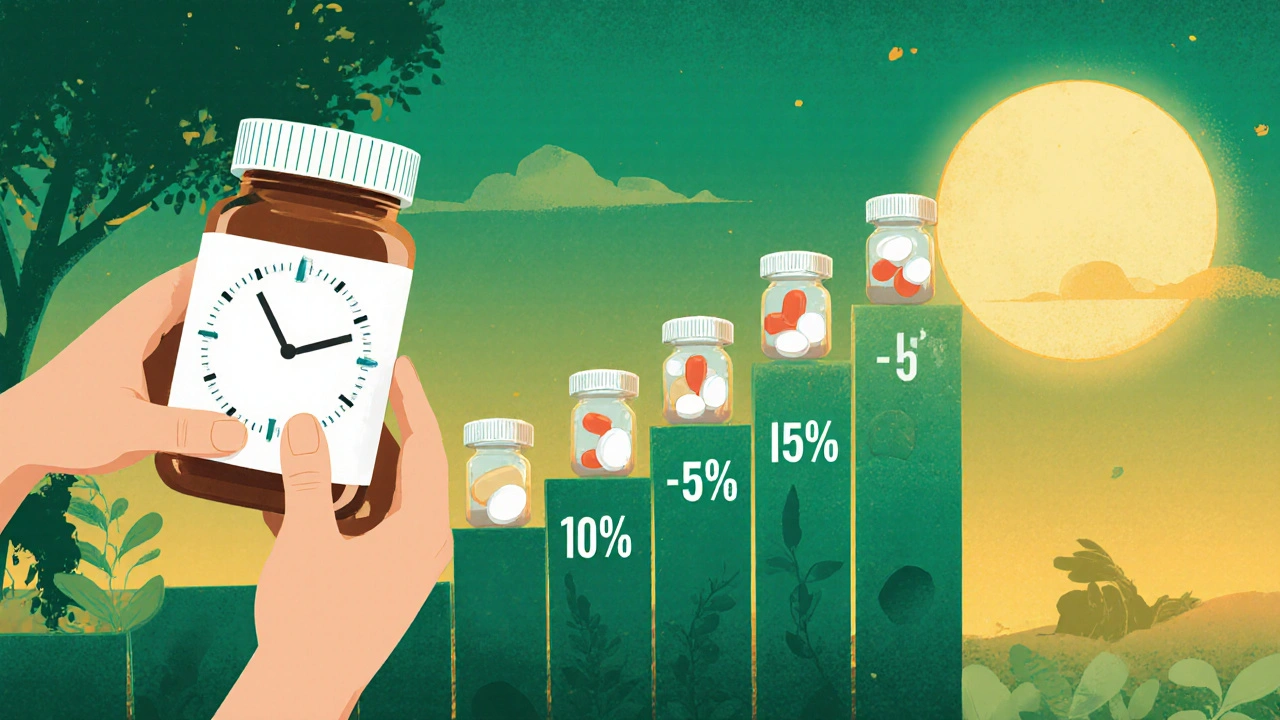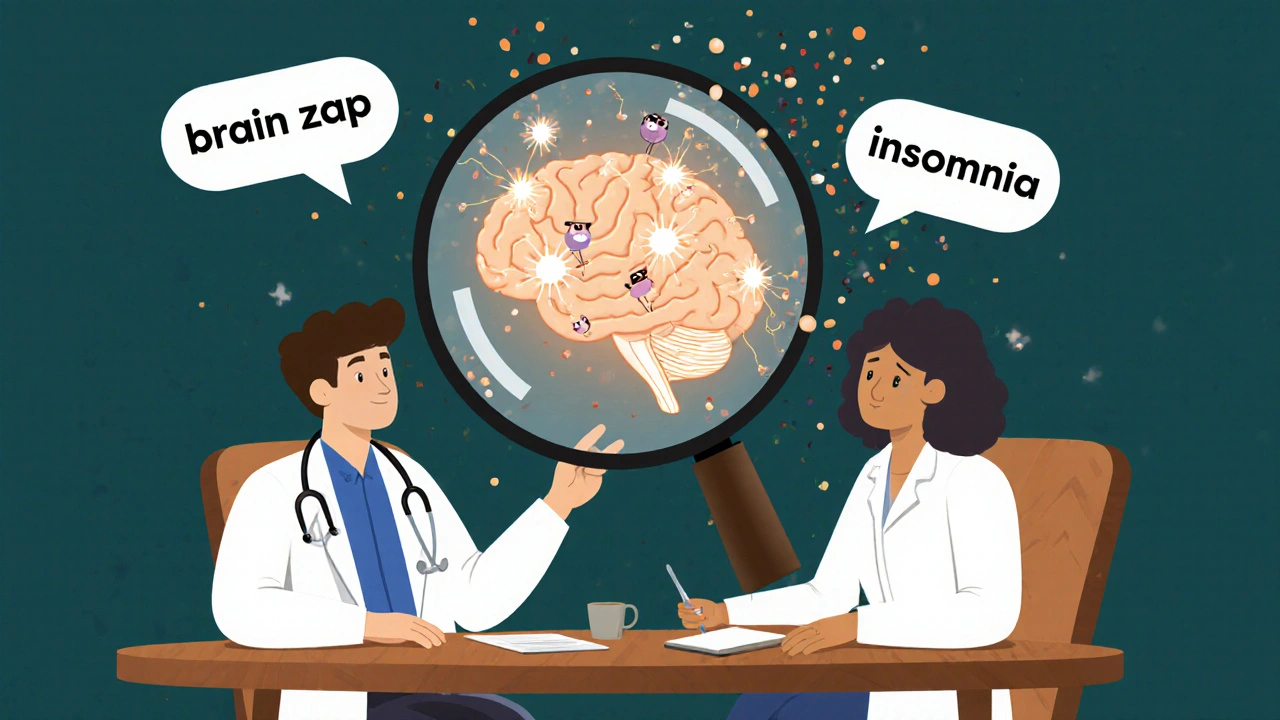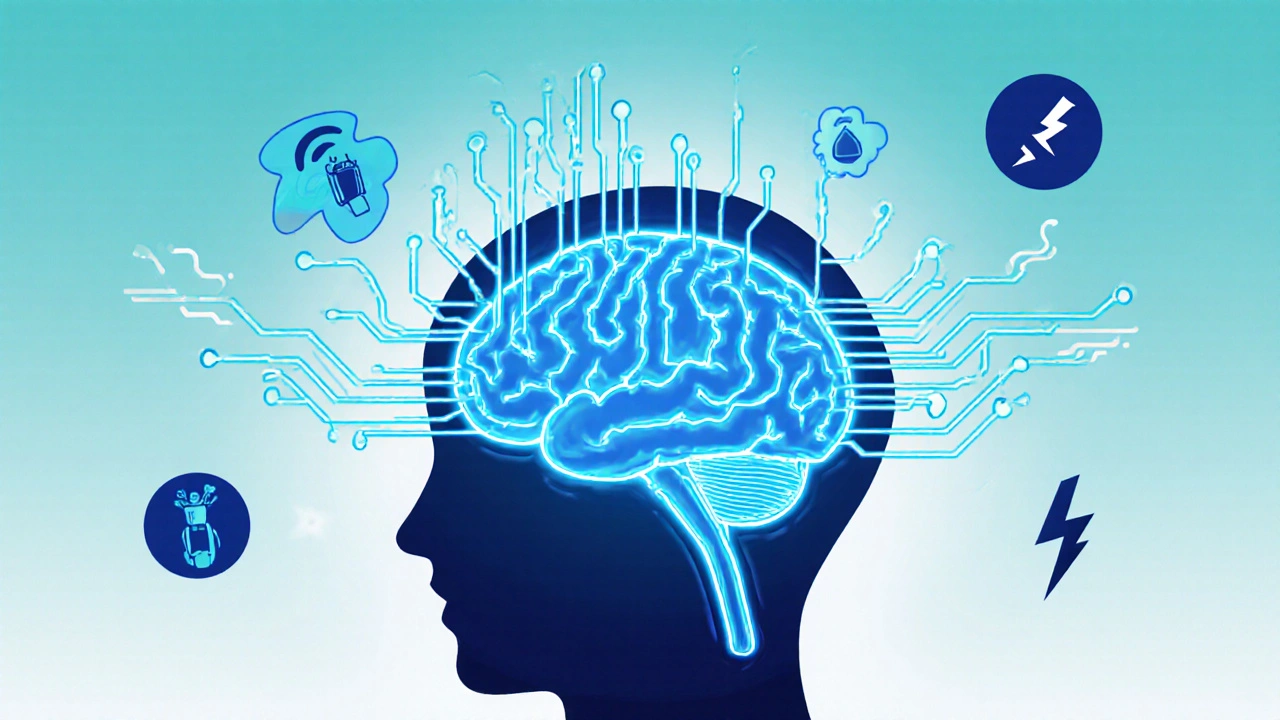Antidepressant Tapering Calculator
How to Use This Calculator
This tool helps determine a safe tapering schedule for discontinuing antidepressants. The goal is to reduce symptoms and minimize discontinuation syndrome risk.
Your Safe Tapering Schedule
Taper Steps
Important Notes
For fluoxetine: The long half-life means tapering can be slower than other antidepressants.
For MAOIs: Must be tapered under strict medical supervision due to high risk.
For paroxetine and venlafaxine: Symptoms may be more severe - consider slower tapering.
Stopping antidepressants isn’t as simple as just skipping a pill. For many people, the body doesn’t bounce back instantly - and that’s not a sign of weakness or failure. It’s a physical reaction called antidepressant discontinuation syndrome. This isn’t addiction. It’s not mental instability. It’s your nervous system adjusting after being chemically supported for weeks, months, or even years. If you’ve ever felt dizzy, nauseous, or like your brain was short-circuiting after missing a dose, you’re not alone. And you’re not imagining it.
What Exactly Is Antidepressant Discontinuation Syndrome?
Antidepressant discontinuation syndrome happens when you reduce or stop taking an antidepressant after using it for at least a month. Your brain adapted to the drug’s presence. Serotonin, norepinephrine, or other neurotransmitters were being regulated by the medication. When you remove it, your brain has to relearn how to balance itself - and that process can cause a range of uncomfortable, sometimes scary, symptoms.
The term was originally pushed by pharmaceutical companies to avoid calling it “withdrawal,” since antidepressants don’t cause cravings or compulsive use like opioids or benzodiazepines. But experts now agree: it’s a true withdrawal syndrome. The symptoms are real, measurable, and well-documented in medical journals. The American Academy of Family Physicians recognized it back in 2006, and the National Institutes of Health confirmed its clinical significance in 2017.
Think of it like turning off a heater in a cold room. The room doesn’t instantly return to normal temperature - it cools down gradually. Your brain is the same. Abruptly removing the drug is like slamming the door on a system that’s been running steadily for a long time.
Common Symptoms: The FINISH Mnemonic
Doctors use a simple acronym to remember the most common signs: FINISH.
- Flu-like symptoms: Fatigue, muscle aches, chills, headaches, diarrhea. One study found 78% of people experienced fatigue.
- Insomnia: Trouble falling asleep, waking up too early, or having vivid, disturbing dreams. About 65% of people report this.
- Nausea: Upset stomach, vomiting, loss of appetite. Seen in nearly 6 out of 10 cases.
- Sensory disturbances: “Brain zaps” - sudden, brief electric shock feelings in the head, especially when moving the eyes. Up to 63% of people report this. Some describe it as “cotton wool in the head” or tingling in the arms and legs.
- Hyperarousal: Anxiety, irritability, agitation, panic attacks, restlessness. This can feel like your nerves are on fire.
Other symptoms include dizziness, balance problems, mood swings, difficulty concentrating, and even suicidal thoughts - though these are rare and often mistaken for relapse. The Royal College of Psychiatrists also lists akathisia (an intense inner restlessness) and derealization (feeling detached from reality) as possible signs.
These symptoms aren’t random. They’re directly tied to how quickly your body clears the drug from your system. Medications with short half-lives - like paroxetine or venlafaxine - cause sharper, more intense reactions. Fluoxetine, with its long half-life of 4-6 days, is much gentler to stop.
Which Antidepressants Cause the Worst Withdrawal?
Not all antidepressants are created equal when it comes to stopping.
- SSRIs (like sertraline, paroxetine, fluoxetine): Paroxetine is the worst offender. Its short half-life means symptoms can hit within hours of a missed dose. Brain zaps are most common here.
- SNRIs (like venlafaxine, duloxetine): Venlafaxine is notorious. Nearly half of users report severe withdrawal. Symptoms are often more intense than SSRIs, including high blood pressure spikes and extreme anxiety.
- TCAs (like amitriptyline, nortriptyline): These older drugs can cause movement issues - tremors, stiff muscles, balance problems - similar to Parkinson’s.
- MAOIs (like phenelzine, tranylcypromine): These are the most dangerous to quit cold turkey. Symptoms can include aggression, psychosis, seizures, and catatonia. Medical supervision is mandatory.
Even switching brands or generics can trigger symptoms. One study found 22% of cases happened not from stopping, but from switching to a different formulation of the same drug. The body notices even tiny changes in how the drug is absorbed.

How Long Does It Last?
Most medical sources say symptoms last 1-2 weeks. But real-world experience tells a different story.
The NIH says symptoms usually resolve within two weeks. But patient communities like Surviving Antidepressants - with over 15,000 members - report that 73% of people experience symptoms longer than two weeks. One in four say symptoms lasted more than six months. A 2022 study in the Journal of Clinical Psychiatry found nearly 19% of people still had symptoms after three months.
Protracted withdrawal - lasting months or even years - is now being taken seriously by clinicians. It’s not common, but it’s real. People describe ongoing brain fog, emotional numbness, sleep disruption, and sensory sensitivity long after stopping. These cases are often dismissed as “relapse” or “anxiety,” but they’re different. Relapse symptoms build slowly. Withdrawal hits fast and fades quickly if you restart the medication.
How to Avoid or Reduce Withdrawal Symptoms
The best way to handle discontinuation syndrome? Don’t let it happen in the first place.
- Taper slowly. Don’t just cut your dose in half. Most experts recommend a 6-8 week taper for SSRIs. For venlafaxine or other short-acting drugs, go even slower - 8-12 weeks or more. Some people need to reduce by 10% every 2-4 weeks.
- Use a longer-acting drug. If you know you’ll want to stop later, ask your doctor about switching to fluoxetine first. Its long half-life makes tapering much smoother.
- Don’t skip doses. Missing one pill can trigger symptoms in sensitive people. If you’re traveling or forget a dose, don’t try to “make up” for it. Just resume your regular schedule.
- Never switch generics without telling your doctor. Even small differences in fillers or release mechanisms can cause withdrawal. Your body notices.
- Plan ahead. Pregnancy, major life changes, or stress are common times people want to quit. Don’t do it without medical guidance. One study found 41% of pregnant women stop antidepressants on their own - and end up in crisis.
What to Do If Symptoms Start
If you start feeling dizzy, nauseous, or like your brain is buzzing:
- Don’t panic. These symptoms are uncomfortable, but not life-threatening.
- Call your prescriber immediately. Most doctors will tell you to go back to your last dose. Symptoms usually vanish within 72 hours.
- Don’t restart another antidepressant. That can make things worse. Stick with the original drug until you and your doctor decide on a new plan.
- Track your symptoms. Write down what you feel, when it started, and how bad it is. This helps your doctor tell the difference between withdrawal and relapse.
Many people are told their symptoms are “just stress” or “anxiety returning.” That’s wrong. Withdrawal symptoms start within hours or days - relapse takes weeks. If your symptoms appeared right after you changed your dose, it’s likely discontinuation syndrome.

Why So Many People Are Misdiagnosed
On Reddit’s r/mentalhealth, a 2022 thread with over 1,200 comments found that 87% of people felt their doctors dismissed their symptoms. One woman described being sent to the ER for “panic attacks” - only to be told she was fine after restarting her medication. Another man spent three months in therapy for “depression returning,” when all he needed was to go back on his old dose for a week.
Doctors aren’t always trained on this. Medical school doesn’t emphasize discontinuation syndrome. Many still believe antidepressants aren’t “addictive,” so withdrawal can’t be real. But the evidence is clear: your nervous system changes. And when you remove the drug, it reacts.
Patients who speak up, track symptoms, and bring research to appointments have better outcomes. Don’t be afraid to say: “I think this is withdrawal. Here’s what I’ve read.”
When to Seek Emergency Help
Most symptoms are annoying, not dangerous. But if you experience:
- Severe confusion or hallucinations
- Seizures
- Extreme agitation or violent thoughts
- Difficulty breathing or chest pain
- go to the ER. These are rare, but they can happen, especially with MAOIs or if you’ve mixed medications.
Final Thoughts: You’re Not Broken
Stopping antidepressants is a medical process, not a personal failure. Feeling bad after quitting doesn’t mean you’re weak, dependent, or mentally ill. It means your body worked hard to adapt - and now it’s working hard to reset.
There’s no shame in needing time. There’s no shame in asking for help. And there’s no shame in choosing to stay on medication if it’s helping you live your life.
The goal isn’t to stop at all costs. The goal is to stop safely - when you’re ready, with support, and on your own terms.


Comments
David Cusack
Let me be perfectly clear: antidepressant discontinuation syndrome isn't a 'syndrome'-it's a pharmacological inevitability, and the medical establishment's reluctance to call it 'withdrawal' is nothing short of linguistic cowardice. The DSM-5? Outdated. The NIH? Cautious. The pharmaceutical lobby? Complicit. You don't 'adjust' to a drug-you become chemically dependent. The term 'discontinuation syndrome' is a euphemism for addiction, dressed up in white coats and peer-reviewed jargon. And yes, I've read the studies. All of them.
November 22, 2025 at 05:31
Willie Doherty
Statistical analysis of symptom prevalence reveals a significant deviation from the NIH’s two-week norm. The Surviving Antidepressants dataset, while self-selected, exhibits a mean duration of 11.4 weeks (SD=8.2) with a 95% CI of 9.1–13.7. The discrepancy between clinical guidelines and real-world outcomes suggests a systemic underestimation of neuroadaptation timelines. Furthermore, the correlation between half-life and symptom severity (r=0.83, p<0.01) supports a pharmacokinetic model over a psychosomatic one. This is not anecdotal-it’s biologically quantifiable.
November 22, 2025 at 20:32
Darragh McNulty
YOU ARE NOT ALONE 💪❤️
Been there. Done that. Got the brain zaps t-shirt. 🌀
Took me 6 months to taper off venlafaxine. My doc said ‘just push through.’ I cried in the shower every day for three weeks. But I did it. Slow. Tiny cuts. Like shaving a bar of soap with a butter knife. And now? I’m happier than I’ve been in 10 years. No meds. No guilt. Just me. You got this. 💙
November 23, 2025 at 19:14
Elaina Cronin
It is imperative that we acknowledge the profound inadequacy of current medical education regarding pharmacological neuroadaptation. The dismissal of patient-reported symptoms as 'anxiety' or 'relapse' constitutes a form of epistemic injustice. The data is unequivocal. The suffering is real. And the failure to implement standardized, evidence-based tapering protocols is not merely negligent-it is ethically indefensible. I urge all clinicians to revisit the 2017 NIH guidelines and cease perpetuating misinformation.
November 24, 2025 at 18:55
Logan Romine
So let me get this straight-you’re telling me the brain is like a toaster, and when you unplug it, it doesn’t just ‘cool down’? Shocking. Who knew biology wasn’t a Disney movie? 🤡
Meanwhile, my psychiatrist still thinks ‘brain zaps’ are ‘vibes.’
Anyway, I’m just here for the drama. And the free antidepressant samples. 😘
November 26, 2025 at 04:28
Franck Emma
I stopped paroxetine cold turkey. Three days later I was screaming into a pillow at 3 a.m. because my skull felt like it was splitting open. I thought I was dying. I called 911. They laughed. They said I was ‘overreacting.’ I didn’t sleep for 11 days. I haven’t trusted a doctor since.
November 27, 2025 at 02:40
Florian Moser
Thank you for sharing this vital information with such clarity and compassion. Many people suffer in silence because they believe their symptoms are imaginary or a sign of weakness. This post corrects that dangerous misconception. Tapering slowly, using longer-acting alternatives like fluoxetine, and tracking symptoms are not just recommendations-they are medical necessities. Your detailed breakdown of the FINISH mnemonic is particularly helpful. Please continue advocating for patient-centered care. You are making a difference.
November 28, 2025 at 18:59
Nikhil Purohit
Bro, I’m from India and we don’t even have access to proper tapering plans here. My doc just said ‘stop it’ and gave me a pamphlet. I got brain zaps for 4 months. My mom thought I was possessed. 😅
But I survived. Now I help others on Reddit. If you’re reading this and you’re scared-breathe. It gets better. Slow is the only way. And you’re not broken. You’re just rewiring.
November 30, 2025 at 07:53
Michael Marrale
Wait… so you’re telling me the government and Big Pharma are hiding this? That’s why my cousin vanished for 18 months after quitting Zoloft? I always thought she just ‘ran away’… but what if she was trapped in withdrawal? What if they’re drugging us to keep us docile? And what about the microchips in the pills? I read a guy on YouTube who said the brain zaps are actually signals from satellites…
December 2, 2025 at 02:32
David vaughan
I had the brain zaps for 11 weeks. I tapered 5% every 3 weeks. I cried. I slept 14 hours a day. I thought I was going crazy. But I didn't restart. And now? I feel more alive than I did on meds. Thank you for writing this. I needed to hear it.
December 2, 2025 at 22:06